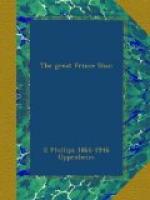“His lordship is very much occupied, Mr. Nigel,” he announced. “He is not seeing any other callers. He left word, however, that you were to be shown in the moment you arrived.”
“His lordship is quite well, I hope?”
“Well in health, sir, but worried, and I don’t wonder at it,” the man replied, speaking with the respectful freedom of an old servant. “I never thought I’d live to see such times as these.”
A man in the early sixties, still good-looking, notwithstanding a somewhat worn expression, looked up from his seat at the library table on Kingley’s entrance. He nodded, but waited until the door was closed behind the retreating servant before he spoke.
“Good of you to come, Nigel,” he said. “Bring your chair up here.”
“Bad news?” the newcomer enquired.
“Damnable!”
There was a brief silence, during which Nigel, knowing his uncle’s humours, leaned back in his chair and waited. Upon the table was a little pile of closely written manuscript, and by their side several black-bound code books, upon which the “F.O.Private” still remained, though almost obliterated with time. Lord Dorminster’s occupation was apparent. He was decoding a message of unusual length. Presently he turned away from the table, however, and faced his nephew. His hands travelled to his waistcoat pocket. He drew out a cigarette from a thin gold case, lit it and began to smoke. Then he crossed his legs and leaned a little farther back in his chair.
“Nigel,” he said, “we are living in strange times.”
“No one denies that, sir,” was the grave assent.
Lord Dorminster glanced at the calendar which stood upon the desk.
“To-day,” he continued, “is the twenty-third day of March, nineteen hundred and thirty-four. Fifteen years ago that terrible Peace Treaty was signed. Since then you know what the history of our country has been. I am not blowing my own trumpet when I say that nearly every man with true political insight has been cast adrift. At the present moment the country is in the hands of a body of highly respectable and well-meaning men who, as a parish council, might conduct the affairs of Dorminster Town with unqualified success. As statesmen they do not exist. It seems to me, Nigel, that you and I are going to see in reality that spectre which terrified the world twenty years ago. We are going to see the breaking up of a mighty empire.”
“Tell me what has happened or is going to happen,” Nigel begged.
“Well, for one thing,” his uncle replied, “the Emperor of the East is preparing for a visit to Europe. He will be here probably next month. You know whom I mean, of course?”
“Prince Shan!” Nigel exclaimed.
“Prince Shan of China,” Lord Dorminster assented. “His coming links up many things which had been puzzling me. I tell you, Nigel, what happens during Prince Shan’s visit will probably decide the destinies of this country, and yet I wouldn’t mind betting you a thousand to one that there isn’t a single official of the Government who has the slightest idea as to why he is coming, or that he is coming at all.”




